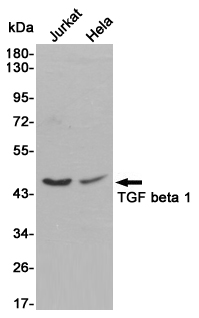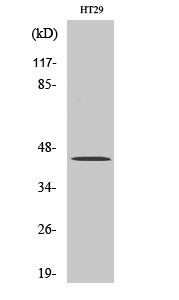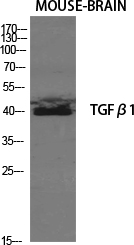


| WB | 咨询技术 | Human,Mouse,Rat |
| IF | 咨询技术 | Human,Mouse,Rat |
| IHC | 1/50-1/100 | Human,Mouse,Rat |
| ICC | 1/50-1/200 | Human,Mouse,Rat |
| FCM | 咨询技术 | Human,Mouse,Rat |
| Elisa | 1/10000 | Human,Mouse,Rat |
| Aliases | TGF beta 1; TGFB; CED; LAP |
| Entrez GeneID | 7040 |
| WB Predicted band size | Calculated MW: 44 kDa; Observed MW: 44 kDa |
| Host/Isotype | Rabbit IgG |
| Antibody Type | Primary antibody |
| Storage | Store at 4°C short term. Aliquot and store at -20°C long term. Avoid freeze/thaw cycles. |
| Species Reactivity | Human,Mouse,Rat |
| Immunogen | The antiserum was produced against synthesized peptide derived from human TGF beta1. AA range:336-385 |
| Formulation | Purified antibody in PBS with 0.05% sodium azide,0.5%BSA and 50% glycerol. |
+ +
以下是3-4篇关于TGF-β1抗体的代表性文献及其摘要概括:
1. **"TGF-β signaling in tissue fibrosis: from mechanisms to therapeutic strategies"**
- **作者**:Travis, M.A., Sheppard, D.
- **摘要**:综述TGF-β1在纤维化疾病中的核心作用,探讨其抗体通过阻断信号通路减轻纤维化病理的潜力,包括在肺和肝纤维化模型中的应用。
2. **"TGF-β and immune cells: an important regulatory axis in the tumor microenvironment"**
- **作者**:Bierie, B., Moses, H.L.
- **摘要**:分析TGF-β1在肿瘤免疫抑制微环境中的双重作用,提出使用中和抗体抑制TGF-β1可增强抗肿瘤免疫应答并减少转移。
3. **"Targeting TGF-β signaling for therapeutic gain"**
- **作者**:Akhurst, R.J., Hata, A.
- **摘要**:系统总结靶向TGF-β通路的策略,包括单克隆抗体和受体融合蛋白的开发,强调其在癌症和纤维化疾病中的临床前及临床研究进展。
4. **"A monoclonal antibody against TGF-β1 attenuates hepatic fibrosis in vivo"**
- **作者**:Huang, X., et al.
- **摘要**:报道一种特异性抗TGF-β1单克隆抗体的开发,通过抑制肝星状细胞活化显著减轻小鼠肝纤维化模型的病理表现,验证其治疗潜力。
这些文献覆盖了TGF-β1抗体在纤维化、肿瘤微环境调控及靶向治疗中的关键研究方向和机制。
×